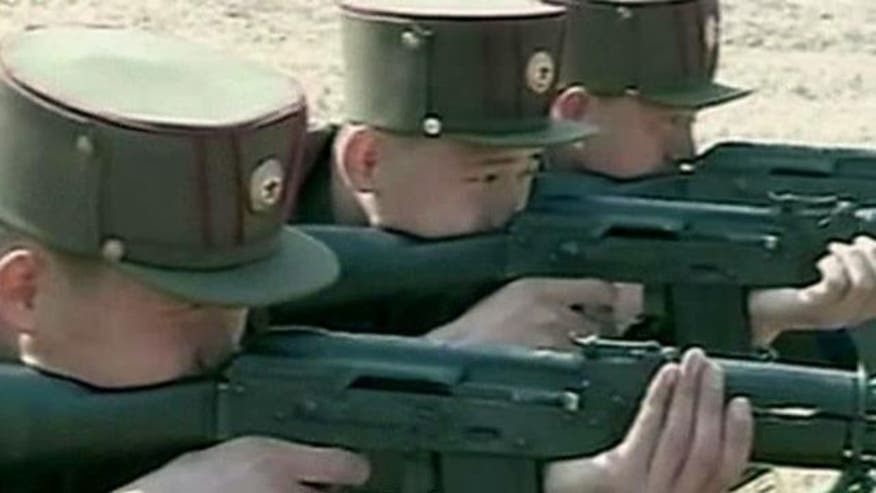
Even experienced North Korea watchers are wondering if this time the annual Kabuki dance in which the country’s dictator threatens war in order to win more food and foreign currency concessions from us and the South Koreans, might not actually be for real.
Its latest ruling psychopath, Kim Jong Eun, is holding his southern neighbor nuclear hostage and threatens to attack us with missiles. Meanwhile, we’re scrambling to install anti-missile defenses on Guam and send a pair of guided missile destroyers to warn the twentysomething dictator away from the firing button. If you want to figure out how we got in this jam, better ask the rulers in Beijing.
They’ve been People’s Republic of North Korea or PRK’s prop and patron for the last six decades, and it’s time for the United States, and the rest of Asia, to make the Chinese step up and help us rein in the PRK–or face the consequences.
Ironically, just last month the Obama administration was congratulating itself for finally convincing China to back tough UN sanctions against North Korea–and claiming that China’s cooperation would at last make that rogue regime behave.
You have to wonder if China went along this time precisely because it knew the UN sanctions would provoke Kim Jong Eun’s fury, thus proving China’s case that sanctions won’t work.
Certainly nothing happens in North Korea that China doesn’t approve of, or at least know about. And we’ll never be able to solve the North Korean problem until we figure out how to handle China.
Beijing supplies the essential food, coal and oil, and goods for North Korea’s elite that keep that country going–and connive at helping the PRK get the arms it needs to harass South Korea and its neighbors, including missile technology.
So when the Chinese pretend to be shocked, shocked at Kim Jon Eun’s intransigence, we should know better. After all, North Korea’s annual antics help to distract American attention away from China’s own imperial efforts elsewhere in Asia, such as claiming sovereignty in the South China Sea.
It’s not likely China will do much to help solve the current crisis, or help defuse future ones, until we establish a firm linkage between China’s policy toward North Korea and our more general policy toward China.
First, we need to make it clear that China will be accountable for any outrages or violations of international law its psychopathic protégé Kim Jong Eun commits.
Second, the rulers in Beijing need to understand that failure to rein in the PRK, and cut off aid and support, will have consequences–whether it means souring our mutual trade relations, or the US stepping up support for the countries China is bullying in the South China Sea, or even on the cyber front where two can play the hacking game.
Third, we need to make it clear that the best long-term solution for Korea is unification under the leadership of the democratic, capitalist South–and that a unified Korea will be an economic and political boon for China and mark a major easing of tensions between our two nations.
It will also mean our 30,000 troops will finally leave the peninsula, something China has wanted for more than half a century.
The fact is, the Chinese see us as technologically gifted but politically and culturally shallow. They figure in twenty years they’re going to be running the global show, so why take our worries over Korea seriously?
It’s time to show them they’d better, before a dictator’s temper tantrum turns into something far, far worse.
Historian Arthur Herman is a senior fellow at the Hudson Institutein Washington, D.C. He is author of seven books, including New York Times bestseller “How the Scots Invented the Modern World” (2001); the Pulitzer Prize Finalist “Gandhi and Churchill”(2008); “To Rule the Waves: How the British Navy Shaped the Modern World” (nominated for the UK’s Mountbatten Prize); and the highly acclaimed “Freedom’s Forge: How American Business Produced Victory in World War II,” which The Economist magazine picked as one of the Best Books of 2012. His most recent work is “The Cave and the Light: Plato Versus Aristotle, and the Struggle for the Soul of Western Civilization” (Random House 2013). Follow him on Twitter@ArthurLHerman.

